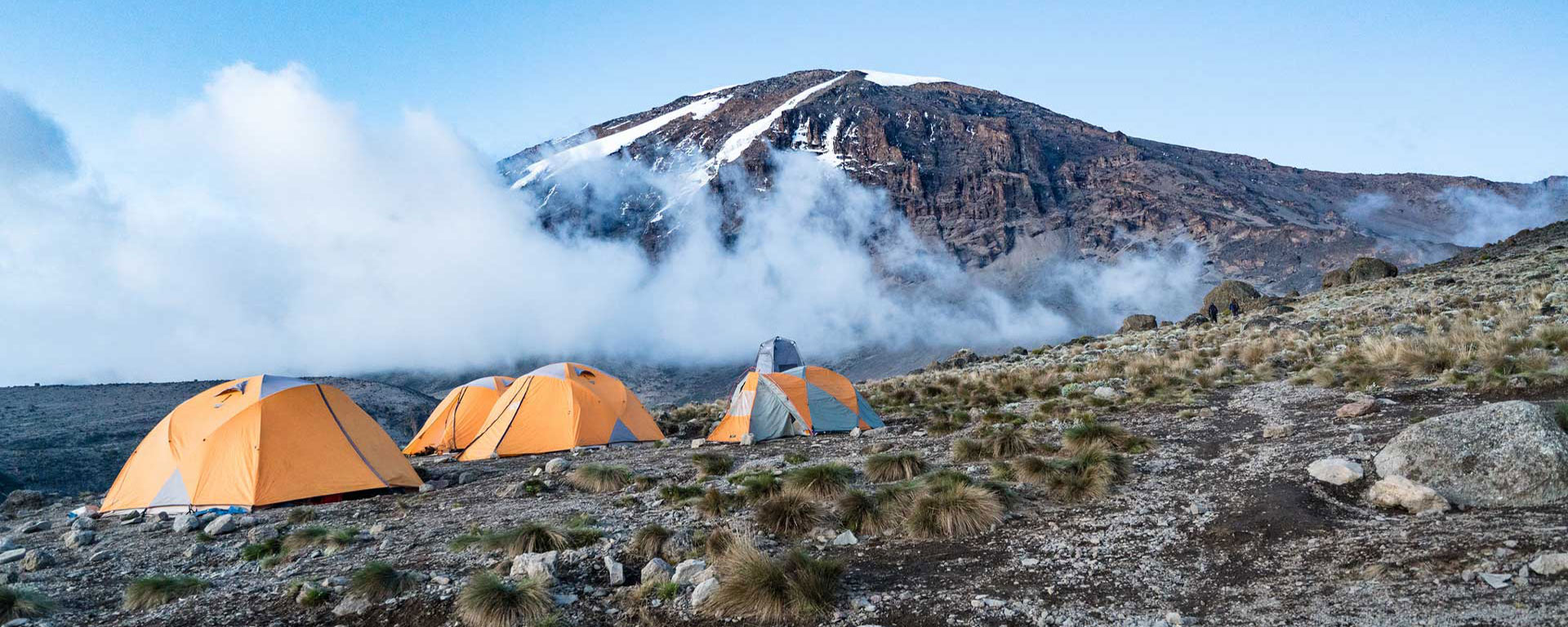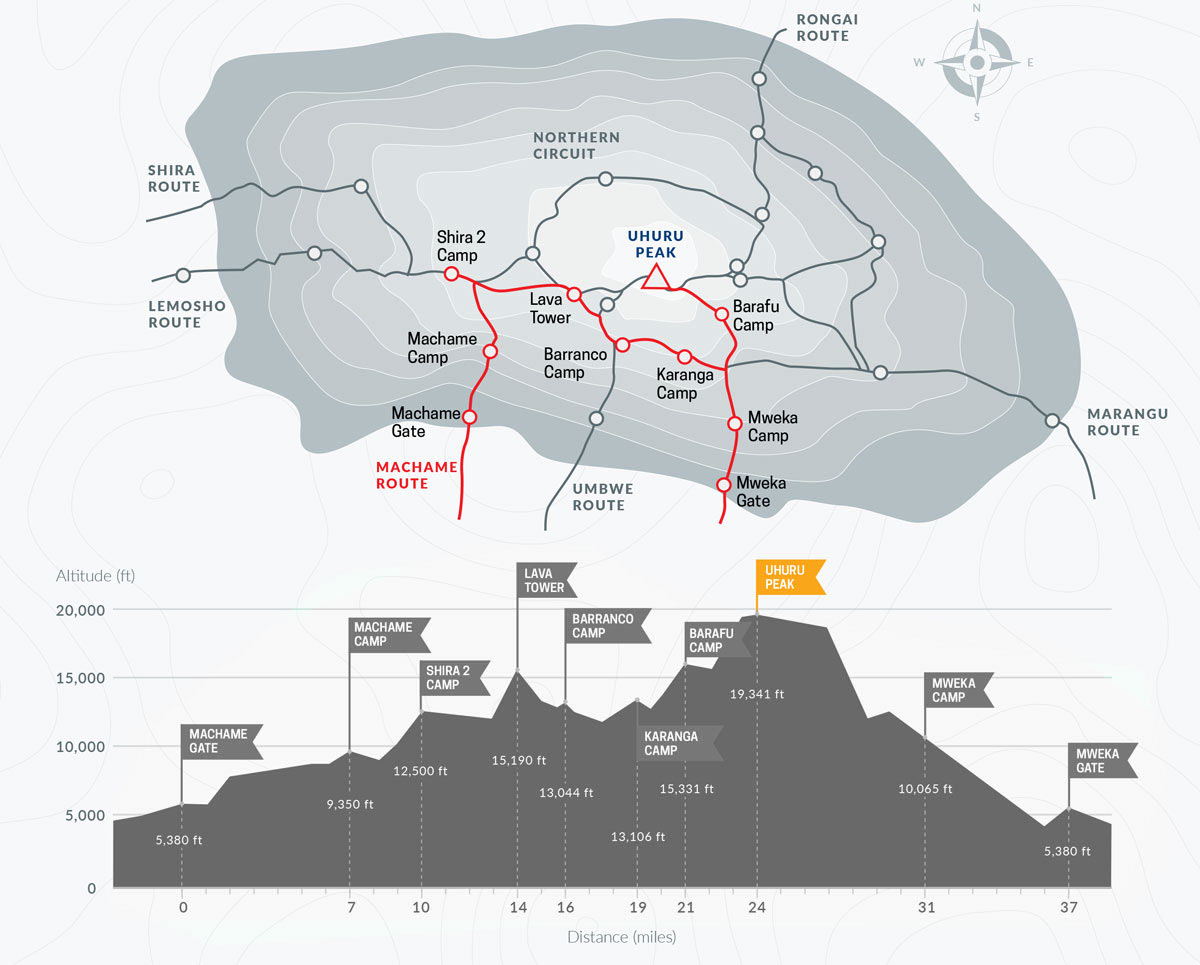Optional trip packages before/after this safari:
- Seeing the Mountain Gorillas
- Staying for 2-3 days at The School of St Jude
- Enjoying a beach getaway to Zanzibar
- Go on a Gorillas, Water safari and Chimps tour in Uganda
- Tour Victoria Falls in Zimbabwe
Hiking time: 7 hours
Distance: ~ 18 km
Habitat: Rainforest
You will depart Arusha around 8am for the Machame Gate, which is about 1.5 hours drive. Upon completion of entry formalities, you will begin walking through the mist for about an hour on a 4×4 track into the rain forest. The track ends, but the trail continues up through the forest. You will likely hear birds in the canopy above, and may even see black & white colobus monkeys and other species as they parade through the forest. The trek is quite long (18km), though not very steep, and will take approx 7 hours to reach your first camp. Machame Camp is just above the forest zone and when it is clear, there are views of Shira Ridge and the summit itself ahead.
Hiking time: 6 hours
Distance: 9 km
Habitat: Scrub
The distance is shorter today, but the path is harder and rocky. Rise early and after breakfast, climb for approximately one hour to the top of the forest. Continue for a few more hours at a gentler gradient through the scrub zone. After a short lunch and rest, continue up a rocky ridge onto the Shira Plateau. The clouds should clear for a beautiful view of the top of Uhuru Peak, the summit. You are now due west of Kibo and after a short hike you will reach Shira Camp (3840m). The night at this exposed camp will even be colder than the previous night, with temperatures dropping to below freezing.
Hiking time: 7 hours
Distance:15km
Habitat: Semi Desert
Stay at Barranco Camp(3950m)
After approx 5 hours walking through a rocky landscape and semi-desert, and having lunch on the way, you reach Lava Tower, at an altitude of 4630m. This is definitely the toughest day so far. It is normally around this point you may start to feel symptoms of breathlessness, irritability, and headaches for the first time. Afterward, descend for about 680m to Barranco Camp (as per left picture). The day’s acclimatisation benefits become clear once you descend from Lava Tower’s 4630m altitude. This descent to Barranco Camp takes about 2 hours and offers great opportunities to take beautiful photographs of the Western Breach and Breach Wall.
Barranco Camp is situated in a valley below the Breach and Great Barranco Wall, which should provide you with a memorable sunset while you wait for the preparation of your dinner and sleep.
Hiking time: 4 hours
Distance: 7 km
Habitat: Stony Desert
Karanga Valley Camp (3950m)
Today you trek to Karanga Valley Camp, at 3950m, between Barranco and Barafu Camps. The day begins with a scramble up the steep ‘Barranco Wall’, but all the hard work is rewarded with the views you get both during and after climbing it. Travel on through lots of “ups and downs” with the summit’s glaciers looming above to your left and the jagged peaks of Mawenzi straight ahead.
You will reach Karanga Valley Camp after 3-4 hours for a hot lunch. Afternoon to relax or to take excursions from camp. This day is very important for acclimatisation.
Hiking time: 5 hours
Distance: 6 km
Habitat: Desert
Barafu Camp (4550m)
From here the trail turns steadily uphill. The temperature will grow colder and the landscape more sparse as you approach Barafu Camp. Barafu Camp is set on a small, exposed flat area on a ridge, acting as a base camp from which you will make your summit attempt at midnight. Total trekking time is 4-5 hours, with a hot lunch upon reaching camp. The afternoon is yours to rest and prepare for the long night ahead. Eat and drink as much as possible before retiring early to your tent for rest and sleep. Make sure you familiarize yourself with the terrain before dark to avoid any accidents. The summit is now only 1345m above and so you will start making the final ascent just after midnight. This last push will probably be the hardest thing you will ever put your body through in your life, so try and take some quiet time to mentally prepare yourself. Prepare your equipment, ski stick and thermal clothing for your last big push and also make sure you have new batteries in your headlamp and camera as well as a spare set close by. To prevent freezing, it will be wise to carry your water in a thermal flask. Go to bed at round about 7pm and try to get some precious sleep for a few hours.
Barafu Camp(4550m)-Uhuru Peak(5895m)-Mweka Camp(3100m)
Hiking time: 7 hours to reach Uhuru Peak and 8 hours to descend to Mweka.
Distance: 7 km ascent and 11km descent
Habitat: Stone Scree and Ice-Capped
The steaming hot drink will arrive very early on this momentous day. A midnight wake-up call is the start of a 15 hour trekking day. At around 12:30am you start to shuffle off into the night. Temperatures will range from just below freezing at midnight to between -12 to -10 degrees celsius just before dawn at the summit. You will start by heading in a northwesterly direction and ascend through heavy scree towards Stella Point on the crater rim (which marks the end of the steep track). On the way, you will pass some glaciers and depending on the moon, you may actually be able to turn off your headlamp and travel by moonlight for a while. This 6-hour walk to Stella Point is, for many climbers, the most challenging both mentally and physically. As you get closer to Stella Point, you will start walking through very loose scree and it will get very tough, sliding back again after each step forward. Keep going and use all that mental energy inside you to keep moving forward-one step at a time … At Stella Point (5685m) you will stop for a short rest and be rewarded with a great sunrise (weather permitting).
From Stella Point, you will normally encounter snow all the way on your last 1 hour ascent to Uhuru Peak, the summit (5895m). You may be able to see the summit sign on the top of the mountain to encourage you (like the picture on the left). The time you spend on the summit will depend on the weather conditions, but do not stop on the peak for too long, as it will be extremely difficult to start again due to cold and fatigue.
Enjoy your accomplishment and take a moment to breathe it all in. The trek back down to Barafu Camp from the summit takes 2-3 hours and climbers often overlook this part. It hurts and since it is over the slippery scree, taking care is essential. At Barafu Camp you will have a well earned, but short rest. Collect the rest of your gear, and then start heading down to Mweka Camp (3100m) for dinner and overnight. The walk from Barafu to Mweka Camp is a relatively easy one, but because you will be so tired, you will still need to summon all your strength to reach it.
Mweka camp (3100m) – Mweka Gate (1980m) Hiking/Descend time: 3 hours, Distance: About 15 km’s Habitat: Forest.
Breakfast and lunch provided.
Before starting the trek down you may like to take those last set of pictures of your climbing team as well as give out all the tips. On the way down you will have your lunch and then continue onto the park gate.
Afterwards you will be driven back to your hotel in Arusha for enjoying long over shower and relaxing the rest of your day. You have earned it!
Breakfast and dinner provided at the lodge.
This safari package includes:
- All park entrance, camping (or hut) and rescue fees,
- All meals and filtered drinking water while on the mountain,
- Guide (Wilderness First Responder certified), cook and porter salaries and fees (porters are paid
- according to national park recommendations),
- Camping equipment including mountaineering sleeping and mess tents (North Face, Marmot and
- Mountain Hardware), foam mattresses, toilet tent, chairs and tables,
- Emergency oxygen bottles,
- Transfer to/from Kilimanjaro National Park,
- Flying Doctors evacuation insurance
- Toilet tent
This safari package does not include:
- The climb does not include gratuities, soda/alcohol, energy snacks and drinks such as Power Bars,
- Personal camping equipment such as sleeping bags, visa fees, hotel in Arusha, airport transfers,
- travel/health insurance, airfare, or items of a personal nature.



